苏教版牛津英语七年级上册第四单元4food知识点与课文讲解
- 格式:doc
- 大小:46.00 KB
- 文档页数:5
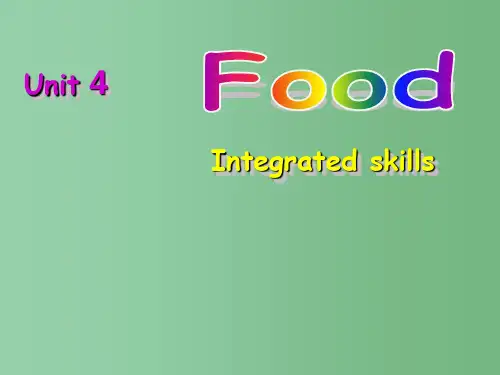
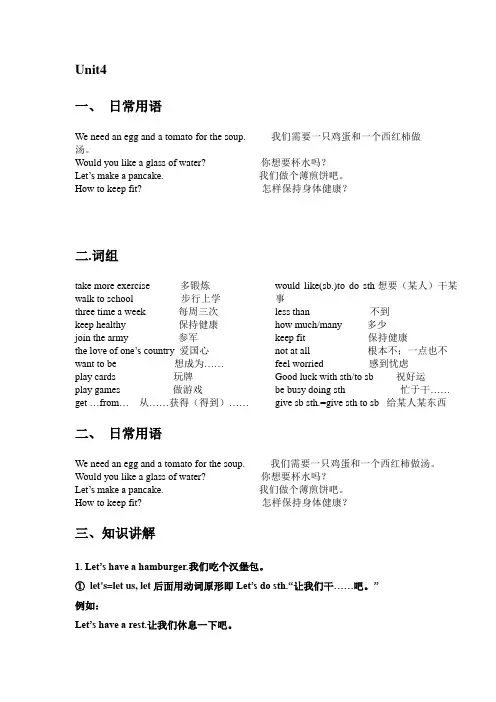
Unit4一、日常用语We need an egg and a tomato for the soup. 我们需要一只鸡蛋和一个西红柿做汤。
Would you like a glass of water? 你想要杯水吗?Let’s make a pancake.我们做个薄煎饼吧。
How to keep fit? 怎样保持身体健康?二.词组take more exercise 多锻炼walk to school 步行上学three time a week 每周三次keep healthy 保持健康join the army 参军the love of one’s country爱国心want to be 想成为……play cards 玩牌play games 做游戏get …from…从……获得(得到)……would like(sb.)to do sth 想要(某人)干某事less than 不到how much/many 多少keep fit 保持健康not at all 根本不;一点也不feel worried 感到忧虑Good luck with sth/to sb 祝好运be busy doing sth 忙于干……give sb sth.=give sth to sb 给某人某东西二、日常用语We need an egg and a tomato for the soup. 我们需要一只鸡蛋和一个西红柿做汤。
Would you like a glass of water? 你想要杯水吗?Let’s make a pancake.我们做个薄煎饼吧。
How to keep fit? 怎样保持身体健康?三、知识讲解1. Let’s have a hamburger.我们吃个汉堡包。
①let's=let us, let后面用动词原形即Let’s do sth.“让我们干……吧。
”例如:Let’s have a rest.让我们休息一下吧。
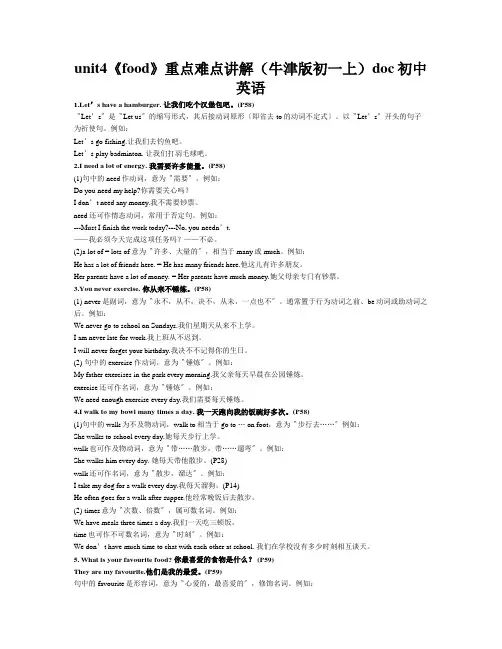
unit4《food》重点难点讲解(牛津版初一上)doc初中英语1.Let’s have a hamburger. 让我们吃个汉堡包吧。
(P58)〝Let’s〞是〝Let us〞的缩写形式,其后接动词原形〔即省去to的动词不定式〕。
以〝Let’s〞开头的句子为祈使句。
例如:Let’s go fishing.让我们去钓鱼吧。
Let’s play badminton. 让我们打羽毛球吧。
2.I need a lot of energy. 我需要许多能量。
(P58)(1)句中的need作动词,意为〝需要〞。
例如:Do you need my help?你需要关心吗?I don’t need any money.我不需要钞票。
need还可作情态动词,常用于否定句。
例如:---Must I finish the work today?---No, you needn’t.——我必须今天完成这项任务吗?——不必。
(2)a lot of = lots of 意为〝许多、大量的〞,相当于many或much。
例如:He has a lot of friends here. = He has many friends here.他这儿有许多朋友。
Her parents have a lot of money. = Her parents have much money.她父母亲专门有钞票。
3.You never exercise. 你从来不锤炼。
(P58)(1) never是副词,意为〝永不,从不,决不,从未,一点也不〞。
通常置于行为动词之前、be动词或助动词之后。
例如:We never go to school on Sundays.我们星期天从来不上学。
I am never late for work.我上班从不迟到。
I will never forget your birthday.我决不不记得你的生日。
(2) 句中的exercise 作动词,意为〝锤炼〞。
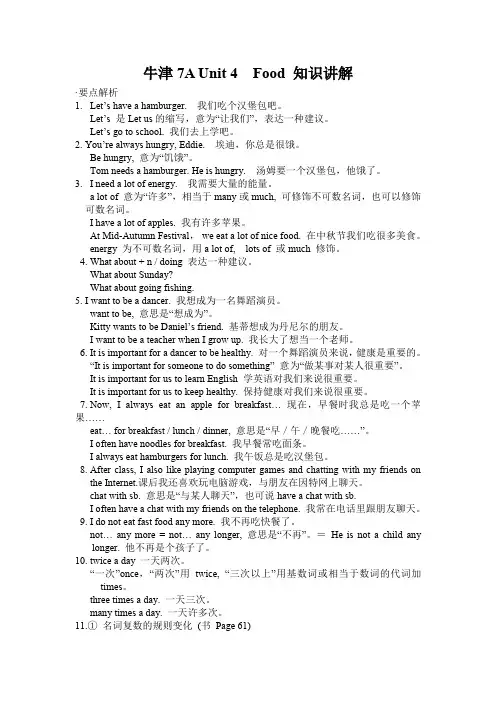
牛津7A Unit 4 Food 知识讲解·要点解析1. Let’s have a hamburger. 我们吃个汉堡包吧。
Let’s 是Let us的缩写,意为“让我们”,表达一种建议。
Let’s go to school. 我们去上学吧。
2. You’re always hungry, Eddie. 埃迪,你总是很饿。
Be hungry, 意为“饥饿”。
Tom needs a hamburger. He is hungry. 汤姆要一个汉堡包,他饿了。
3. I need a lot of energy. 我需要大量的能量。
a lot of 意为“许多”,相当于many或much, 可修饰不可数名词,也可以修饰可数名词。
I have a lot of apples. 我有许多苹果。
At Mid-Autumn Festival,we eat a lot of nice food. 在中秋节我们吃很多美食。
energy 为不可数名词,用a lot of, lots of 或much 修饰。
4. What about + n / doing 表达一种建议。
What about Sunday?What about going fishing.5. I want to be a dancer. 我想成为一名舞蹈演员。
want to be, 意思是“想成为”。
Kitty wants to be Daniel’s friend. 基蒂想成为丹尼尔的朋友。
I want to be a teacher when I grow up. 我长大了想当一个老师。
6. It is important for a dancer to be healthy. 对一个舞蹈演员来说,健康是重要的。
“It is important for someone to do something” 意为“做某事对某人很重要”。
It is important for us to learn English 学英语对我们来说很重要。
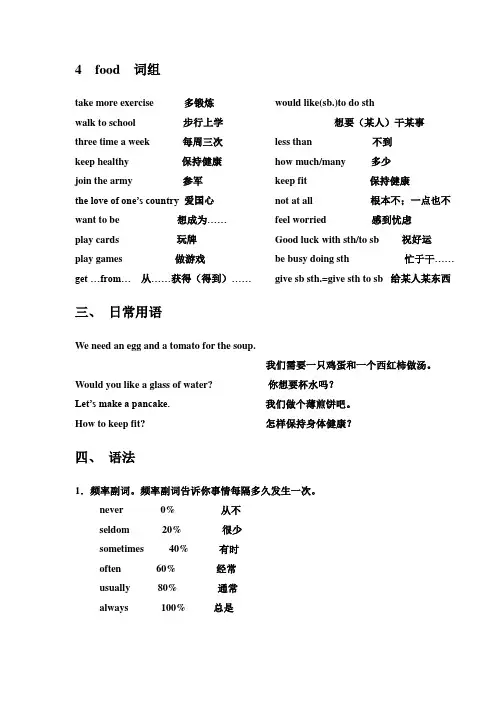
4 food 词组take more exercise 多锻炼walk to school 步行上学three time a week 每周三次keep healthy 保持健康join the army 参军the love of one’s country爱国心want to be 想成为……play cards 玩牌play games 做游戏get …from…从……获得(得到)……would like(sb.)to do sth想要(某人)干某事less than 不到how much/many 多少keep fit 保持健康not at all 根本不;一点也不feel worried 感到忧虑Good luck with sth/to sb 祝好运be busy doing sth 忙于干……give sb sth.=give sth to sb 给某人某东西三、日常用语W e need an egg and a tomato for the soup.我们需要一只鸡蛋和一个西红柿做汤。
W ould you like a glass of water? 你想要杯水吗?Let’s make a pancake.我们做个薄煎饼吧。
How to keep fit? 怎样保持身体健康?四、语法1.频率副词。
频率副词告诉你事情每隔多久发生一次。
never 0% 从不seldom 20% 很少sometimes 40% 有时often 60% 经常usually 80% 通常always 100% 总是①表示频率的副词在句子中放在动词之前,be动词之后。
例如:I always play basketball with my classmates after school.放学后我总是和同学们打篮球。
Mike is always happy.麦克总是开心。
②表示频率的副词提问,用how often。
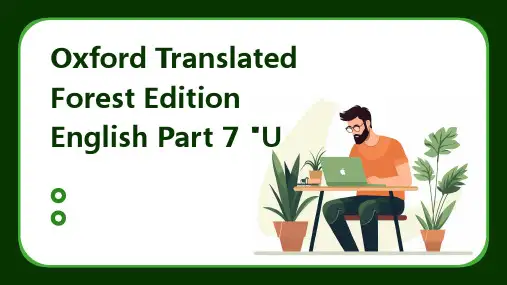

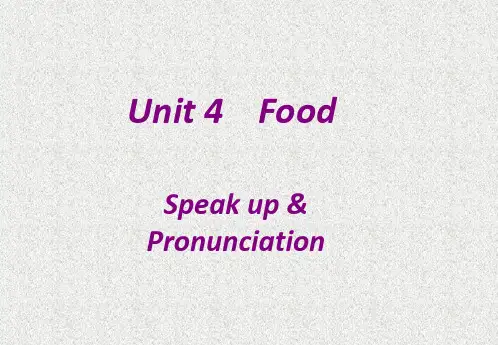
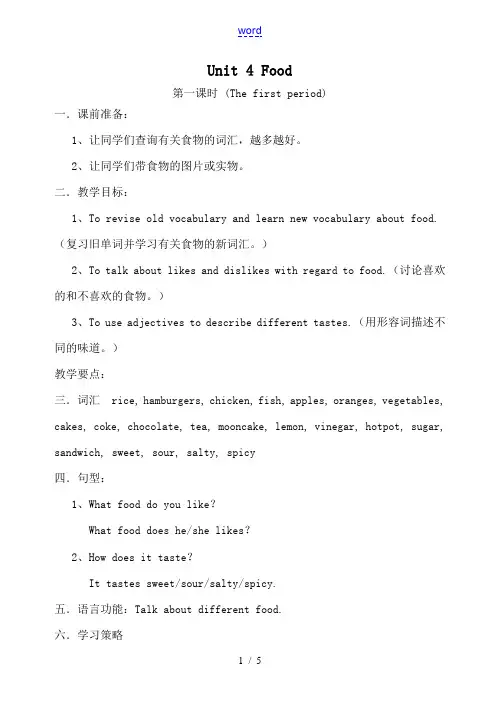
Unit 4 Food第一课时 (The first period)一.课前准备:1、让同学们查询有关食物的词汇,越多越好。
2、让同学们带食物的图片或实物。
二.教学目标:1、To revise old vocabulary and learn new vocabulary about food.(复习旧单词并学习有关食物的新词汇。
)2、To talk about likes and dislikes with regard to food.(讨论喜欢的和不喜欢的食物。
)3、To use adjectives to describe different tastes.(用形容词描述不同的味道。
)教学要点:三.词汇 rice, hamburgers, chicken, fish, apples, oranges, vegetables, cakes, coke, chocolate, tea, mooncake, lemon, vinegar, hotpot, sugar, sandwich, sweet, sour, salty, spicy四.句型:1、What food do you like?What food does he/she likes?2、How does it taste?It tastes sweet/sour/salty/spicy.五.语言功能:Talk about different food.六.学习策略1、To develop students to look at the same thing in many ways.(培养学生对同一事物要有不同看法。
)2、To develop students' ability to classify what they have learned.(培养学生对所学知识分类能力。
)七.智能培养:Make a chart and talk about it.八.教学设计:Food1、Talk about food for three meals and snacks.2、Talk about food for meals one likes and dislikes.3、Talk about food by the table.4、Describe different tastes about food.九.教学步骤:Task Ⅰ1、Talk about food for three meals and snacks. This is a fun activity to learn and revise vocabulary and spelling.2、Of all the food and snacks, get students to work in groups to makea table by asking:What do you like/dislike?Name Love Like DislikeS1:S2:S3:TaskⅡ1、Ask Ss to look at different kinds of food in Part A. Go through the words and make sure that they can pronounce them well and understand their meanings.2、Ask Ss to tick the boxes according to their own likes and dislikes.3、Ask some students to present their answers and say something about their likes and dislikes.4、Ask Ss to report their classmates' likes and dislikes according to the table in Part 1.5、If there is time, ask Ss to talk about their family as well.Task Ⅲ1、Try to bring some pictures of different kinds of food with strong tastes. Get Ss to know the meanings of "sweet, sour, spicy and salty".2、Ask Ss to think of other foods that are salty, sour, spicy or sweet.3、Look at P59 in the textbook and finish them.Task Ⅳ Exercises.教学反思:第二课时 (The second period)课前准备:1、预习阅读资料,查出生词或新语言点。
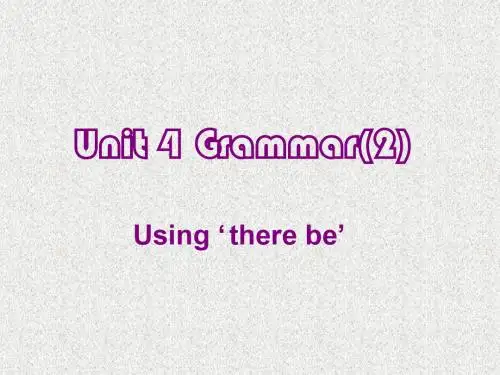
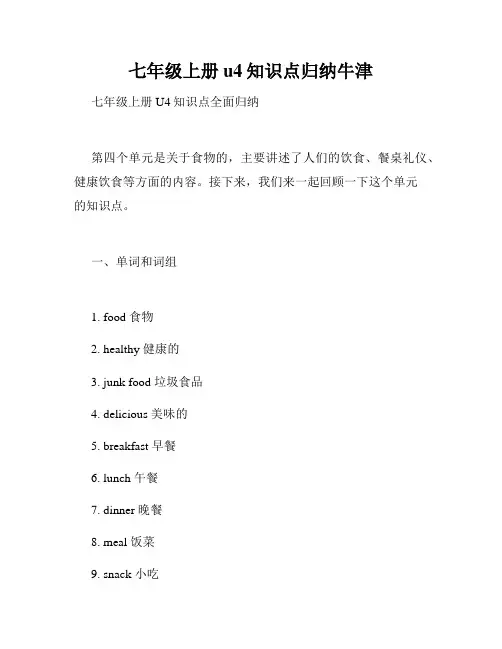
七年级上册u4知识点归纳牛津七年级上册U4知识点全面归纳第四个单元是关于食物的,主要讲述了人们的饮食、餐桌礼仪、健康饮食等方面的内容。
接下来,我们来一起回顾一下这个单元的知识点。
一、单词和词组1. food 食物2. healthy 健康的3. junk food 垃圾食品4. delicious 美味的5. breakfast 早餐6. lunch 午餐7. dinner 晚餐8. meal 饭菜9. snack 小吃10. noodles 面条11. fruits 水果12. vegetables 蔬菜13. drinks 饮料14. eat out 在外面吃15. table manners 餐桌礼仪16. balanced diet 均衡饮食17. overweight 超重的18. underweight 体重过轻的19. starve 挨饿二、语法知识1. food的用法:a. 常作不可数名词用:food is important for our health.b. 用于组成复合名词:food chain, food poisoning.c. 常与不定冠词或复数形态搭配使用:I like a food /some foods.2. there be句型:a. 表示“有”这种存在:There is some milk in the fridge./There are some apples on the table.b. there be句型的疑问句、否定句形式。
3. 形容词的比较级和最高级:a. 一般规则:more / less + 形容词 + than (that)。
b. 特殊规则:good/well, bad/badly, many/much, little/few, far等词的比较级和最高级的用法。
4. 命令句:a. 常用于表达建议、命令、请求等意义。
b. 命令句中常使用祈使动词或者助动词let's。
江苏省如皋市石庄初中2012学年中考英语一轮复习七年级上册《Unit4Food》讲解牛津版一.【精挑细选短语】1. need a lot of energy需要许多能量 (p58)【知识链接】energy n.(U)能量→energetic adj.精力充沛的,be energetic=have a lot of energy 精力充沛e.g. People need energy to live.人活着就需要能量。
2. a bowl of rice 一碗米饭→ two bowls of rice两碗米饭,rice没有复数形式。
3. get tired疲劳→ get+形容词,类似的有:get h ungry挨饿,get angry生气,get scared害怕4. keep fit=keep healthy=stay healthy保持健康,sweet snacks甜食 (p60)5. too much sugar太多的糖【知识链接】too much+不可数名词,太多…,much too+形容词或副词原级,实在太… e.g.①There is too much traffic on the street during rush hours. ②He was much too tired to walk.6. eat meat and vegetables for dinner正餐吃肉和蔬菜,eat hamburgers for lunch午餐吃汉堡【知识链接】⑴eat/have sth for breakfast/linch/supper早/中/晚餐吃…,此处的介词for不能替换为at。
⑵at breakfast/lunch/supper在早/中/晚餐时e.g. Wh at’s for breakfast?早餐吃什么?7. chat with my friends on the Internet和朋友在网上聊天 (注意on the Internet中的介词和冠词)【知识链接】chat with sb和某人聊天,chat online=chat on the Internet网上聊天8. a top student尖子生,top=the best【用法拓展】⑴on top of…=at the top of…在…的顶端 e.g. Father Christmas lands on top of each house on Christmas Eve. ⑵top顶端→bottom底部→at the bottom of…在…的底部9. have a healthy diet or lifestyle饮食或生活方式健康,change one’s diet改变饮食10. plan to eat healthy meals计划吃健康的饭菜,plan to go swimming计划去游泳【知识链接】plan ⑴vi.计划→planning →planned,常用短语plan to do sth计划做某事⑵n.计划,make a plan制订计划, make a plan for…制订…的计划11. be careful with her diet注意饮食 (p62)【知识链接】⑴be careful with/of…注意,珍视⑵be careful (not) to do sth小心(不)做某事12. go roller skating溜旱冰,go (ice) skating滑冰,go skiing滑雪 (p64)13. less than three times a week每周不到三次,three to six times a week每周三到六次 (p68) 【知识链接】less than不到,少于→more than超过,多于14. walk to school=go to school on foot步行上学→walk to…=go to…on foot步行去某地15. Congratulations!祝贺你! (p69)【知识链接】congratulate vt.向…祝贺/道贺,恭喜→congratulation n.祝贺,庆祝(常用复数congratu lations),常用短语“向某人祝贺某事”①congratulate sb on sth②say/offer congratulations to sb on sth e.g.①They congratulated him on winning the 100-metre race.②I offered him my congratulations on his success.16. lie on the couch躺在长沙发上 (p70)【知识链接】lie on the bed躺在床上(不盖任何衣物),lie in bed躺在床上(指盖着被子等衣物)17. Me too.我也如此。
Unit4 food 一.词组take more exercise 多锻炼walk to school 步行上学three time a week 每周三次keep healthy 保持健康join the army 参军the love of one’s country爱国心want to be 想成为……play cards 玩牌play games 做游戏get …from…从……获得(得到)……would like(sb.)to do sth 想要(某人)干某事less than 不到how much/many 多少keep fit 保持健康not at all 根本不;一点也不feel worried 感到忧虑Good luck with sth/to sb 祝好运be busy doing sth 忙于干……give sb sth.=give sth to sb 给某人某东西二、日常用语We need an egg and a tomato for the soup. 我们需要一只鸡蛋和一个西红柿做汤。
Would you like a glass of water? 你想要杯水吗?Let’s make a pancake.我们做个薄煎饼吧。
How to keep fit? 怎样保持身体健康?三、知识讲解1. Let’s have a hamburger.我们吃个汉堡包。
①let's=let us, let后面用动词原形即Let’s do sth.“让我们干……吧。
”例如:Let’s have a rest.让我们休息一下吧。
Let’s play games.让我们做游戏吧。
〖注意〗let’s开头的祈使句,其反意疑问句在句末加shall we?表示包括听话人在内的一种建议。
如果不表示建议,而是提出一种请求,表示允许,不包括听话人在内时,则let us 不缩写成let’s,其反意疑问句为will you?我们踢篮球,好吗?(表示建议)让我们看看你的图画,可以吗?(表示请求允许)2.have动词,“吃、喝;有”。
例如:(注意第三人称单数has )你要喝杯茶吗?你早饭吃些什么?3. You are always hungry, Eddie. 你总是饿,埃迪。
always副词,“一直,总是”,是一个频率副词,常用于一般现在时。
She always has lunch at home.The sun always rises in the east.①hungry形容词,“饥饿的”,其反义词是full,在句中作表语。
Are you hungry?你饿了吗?I always feel hungry after school. 放学后我总是觉得饿。
3. You never exercise.你从不锻炼。
①never副词,“从不,永不”,本身具有否定意义,语气比not重,用never表示否定时,不需要加助动词“not”。
I never go to school late. 我上学从不迟到。
She never writes to her father.她从不给她的父亲写信。
②exercise动词,“锻炼,训练”,在句中作谓语。
例如:Mike’s sister often exercises her voice in the morning.麦克的姐姐经常在早晨嗓子。
He is exercising the boys in swimming.名词,“训练、锻炼(单数);做操;练习、习题(复数)等”。
例如:You’d better take more exercise.Eat less and take more exercise, you will be thin.Have you finished your Chinese exercises?do morning exercises do eye exercises4. I want to be a dancer.我想当一名舞蹈演员。
want to be“想成为……”,want动词,“想,想要”其后可接名词或动词不定式作宾语,也可宾语接动词不定式,即want sth想某物,want to do sth.想做某事;want to to do sth.“想让某人做某事”。
例如:I want some black tea. 我想要些红茶。
What do you want me to do? 你想要我做什么?be动词原形,“做,成为”。
例如:I want to be a doctor. 我想成为一名医生。
Don’t be late!别迟到!5. It’s important for a dancer to be healthy.对一个舞蹈演员来说健康是很重要的。
常见的句型是:It is+ adj.+ for/of sb to do sth。
例如:1.孩子在这条河里游泳很危险。
2.能帮助我,真是太好了。
3.你这么做真粗心。
6. Before, I seldom ate fruit and vegetables.以前,我不常吃水果和蔬菜。
seldom副词,“很少,不常、难得”,其反义词是often。
通常置于行为动词之前;助动词和be动词之后。
是一个表示否定意义的副词。
例如:1.布朗夫人很少外出。
2.米莉上学很少迟到。
7. I ate a lot of sweet snacks between meals.在两餐之间我吃了许多甜食。
between介词,“在(两者之间)”,后面可以跟名词或代词,跟代词时要用宾格。
Put the desk between us.把课桌放在我们俩中间。
between…and…“在……和……之间”,它限于两者之间;如果是三者之间或三者以上,要用介词among。
between和and之间可以是两个人,也可以是两个不同的物或两个点(时间、数字、场所)。
例如:Peter sat between Mary and Jane. 彼得坐在玛丽和简之间。
The shop opens between 9 a.m. and 5 p.m. 商店在上午九点和下午五点间开门。
Mary is sitting among the children. 玛丽坐在孩子们之中。
8. I know that sweet snacks are not good for me. 我知道甜零食对我没有好处。
be good for…“对……有益(有用)”,后接人或事物的名词。
例如:Sunshine is good for your plants. 你的花草要多晒太阳。
Is this kind of food good for me? 这种食物对我身体有益吗?This cream is good for bums. 这种油膏治烧伤和烫伤很管事儿。
Milk is good for children.类似的固定词组还有:be good at “擅长,善于”, 后接名词,代词或动名词。
例如:Kate is good at English. 凯特擅长英语。
Mike is good at playing football. 麦克擅长绘画。
be good to“对……好(和善、慈爱)”,后接表示人的或要格化的名词。
例如:She is good to me. 她对我好。
9. Now, I always eat an apple for breakfast. 现在,我总是早饭吃一个苹果。
eat sth. for breakfast/lunch/supper=have sth. for breakfast/lunch/supper“早饭/午饭/晚饭吃……”。
例如:I ate some bread for breakfast.=I had some bread for breakfast.早饭我吃的面包。
What did you eat for supper?=What did you have for supper?晚饭你吃得什么?10. After class, I also like playing computer games and chatting with my friends on the Internet.课后,我也喜欢玩电子游戏和朋友们在网上聊天。
like doing sth.“喜欢干某事”,后面跟动名词表示习惯性的动作。
playing和chatting属于名词短语,在句中作谓语动词的宾语。
play动词,①“玩,做(游戏),踢(球)”,可以构成以下的固定词组:play cards 玩牌play games 做游戏play football 踢足球②“演奏,吹奏”,可以构成的固定词组有:play the piano 弹钢琴play the violin 拉小提琴②play with…玩……play with water 玩水pla y…with…和……一起玩play football with children 和孩子们一起踢足球②chat动词,“闲谈,聊天”。
例如:They are chatting in the room. 他们在屋子里闲聊。
Mrs Green likes chatting with the friends. 格林夫人喜欢和朋友们聊天。
11. Now, I exercise every day for about 30 minutes.现在,我每天锻炼大约30分钟。
for介词,表示时间时指一段时间,其后表示时间的名词往往用复数形式。
I stayed in Shanghai for three months.我在上海呆了三个月。
He will study in this school for four years.他将在这个学校学习四年。
14. Where did Kitty get her energy from? 基蒂从哪儿获得她的能量?get…from…“从……获得(得到)……”,例如:1.我们从鸡身上得到鸡蛋和鸡肉。
2.What can we get from cow?15. a cold drink冷饮,其反义词组是a hot drink热饮drink 在这课里是名词,“饮料”。
例如:bottled drinks还可以作及物动词,“饮,喝”,如:drink a glass of water喝杯水drink a cup of tea 喝杯茶也还可以作不及物动词,“喝酒、酗酒”。
例如:He doesn’t drink.他没有喝酒的习惯。
My uncle often drinks hard.我叔叔经常酗酒。